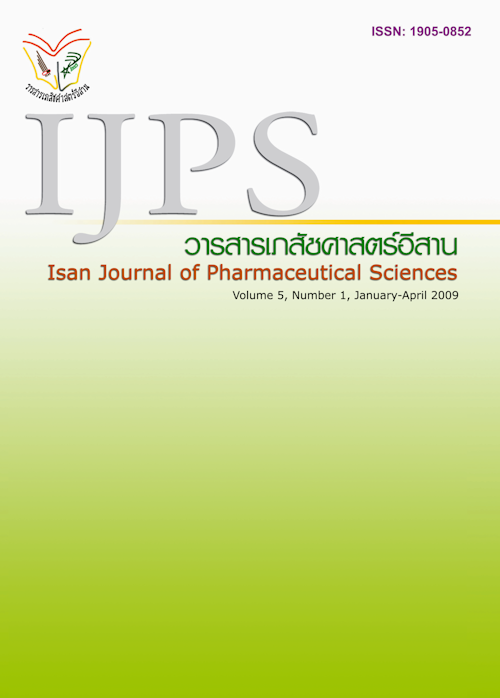Outcome of Chemotherapy Counseling in Oncology Patients by Pharmacist
Main Article Content
Abstract
Cancer is a disease that requires long term treatment and intensive monitoring. There are several methods to manage cancer but most cases are treated with chemotherapy. Patients who receive chemotherapy should receive advice on side effect management and proper self-care to properly cope with drug related problems and ultimately obtain the maximum benefits from the treatment. The prospective descriptive study was designed to evaluate the outcome of chemotherapy counseling utilizing standard questionnaires by a pharmacist who participated in an oncology care team during December 2004 to March 2005. The study setting was a medical oncology patient care unit (5E ward), Srinagarind Hospital, Khon Kaen University, Thailand. Ninety-one cancer patients were assessed for eligibility and 82 (90.1%) were recruited in this study. The counseling by pharmacist took place three times before and after patient received chemotherapy at each visit. The patients were evaluated in terms of knowledge, satisfaction and frequency of side effects. The results demonstrated that patients had an improved knowledge score based on disease and chemotherapy, possible side effect of chemotherapy and self care behavior after receiving chemotherapy counseling by a pharmacist following three evaluation periods (p < 0.01). Satisfaction score also significant improved (4.8 of 5) after receiving intervention by a pharmacist (p < 0.01). As for the adverse event evaluation, gastrointestinal (GI) side effects such as anorexia were the most common adverse event (91.5%) found in the first evaluation period however GI side effects were reported to be less in degree and frequency at the second and third follow up period post counseling. In conclusion, the pharmacist intervention based on chemotherapy counseling improved knowledge and satisfaction in oncology inpatients and reduced adverse events following chemotherapy treatment. The results of the present study should be used to encourage the establishment of oncology pharmacy practice model. By utilizing this pharmaceutical care activity, pharmacists will be able to serve as valuable health care staffs who can ultimately improve the quality of oncology care in the future.
Article Details
In the case that some parts are used by others The author must Confirm that obtaining permission to use some of the original authors. And must attach evidence That the permission has been included
References
Attasara P. Cancer Registry. National Cancer Institute, Department of Medical Services, Ministry of Public Health Thailand; 2006.
Balmer C, Valley AW. Cancer treatment and chemotherapy. In: Dipiro JT, Talbert RL, Yee GC, Matzke GR, Wells BG, Posey LM, editors. Pharmacotherapy. 5th ed. Connecticut: Appleton & Lange Asimon & Schuster; 2002. p.2175-2218.
Cohen MR, Anderson RW, Attilio RM, et al. Preventing medication errors in cancer chemotherapy. Am J Health-Syst Pharm1996; 53(1): p.737-746.
Deerasamee S. Cancer control in Thailand: Cancer control in Asia. In: Deerasamee S, editor. Oncology II after 2000. Proceedings of National Cancer Conference in celebration of the auspicious occasion of Her Majesty the Queen 6th cycle birthday anniversary, 2003; Nov 12-14; Bangkok. p.35.
Dikken C, Sitzia J. Patientsû experiences of chemotherapy: side-effects associated with5-fluorouracil + folinic acid in the treatment of colorectal cancer. J Clin Nurs 1998; 7(4):371-379.
Dodd MJ. Assessing patient self-care for side effects of cancer chemotherapy--part I. Cancer Nurs1982; 5(6): p.447-451.
Dodd MJ. Cancer patients’ knowledge of chemotherapy: assessment and informational interventions. Oncol Nurs Forum 1982; 9(3): p.39-44.
Dodd MJ. Measuring informational intervention for chemotherapy knowledge and self-care behavior. Res Nurs Health 1984 Mar; 7(1): p. 43-50.
Dodd MJ. Self-care for patients with breast cancer to prevent side effects of chemotherapy: a concern for public health nursing. Public Health Nurs 1984 Dec; 1(4): p.202-209.
Eide H, Graugaard P, Holgersen K, et al. Physician communication in different phases of a consultation at an oncology outpatient clinic related to patient satisfaction. Patient Educ Couns 2003 Nov; 51(3): p.259-266.
Foltz AT, Gaines G, Gullatte M. Recalled side effects and self-care actions of patients receiving inpatient chemotherapy. Oncol Nurs Forum1996 May; 23(4): p.679-683.
Graham MC, Pecoraro DA, Ventura M, et al. Reducing the incidence of stomatitis usinga quality assessment and improvement approach. Cancer Nurs 1993; 16(2): p.117-122.
Hadjiyannt M, Valianatou K, Tzilianos M, et al. Prolonged thrombocytopenia after procarbazineoverdose. Eur J Cancer 1992; 28A (6/7): p.1299.
Hornsten P, Engberg BS, Gahrton G, et al. CCNU toxicity after an overdose in a patient with Hodgin’s disease. Scan J Haemat 1983; 31: p.9-14.
Liebman MC. Oral care: Better education result in less stomatitis. Oncology Nurs Forum 1992;19(6): p.939-941.
Pineo HM, Giaccone G. Chemotherapy. Lancet 1997May; 349: sII7-sII9.
Perkins LD, Mc Cormack AJ. Medication discharge consultation program in a small community hospital. Am J Hosp Pharm 1981 Apr; 38: p.530-533.
Ream E, Richardson A. The role of information in patients’ adaption to chemotherapy and radiotherapy: a review of the literature. Eur J Cancer 1996; 5: p.132-138.
Richardson JL, Marks G, Levine A. The influence of symptoms of disease and side effects of treatment on compliance with cancer therapy. J Clin Oncol 1988 Nov; 6(11): p.1746-1752.


